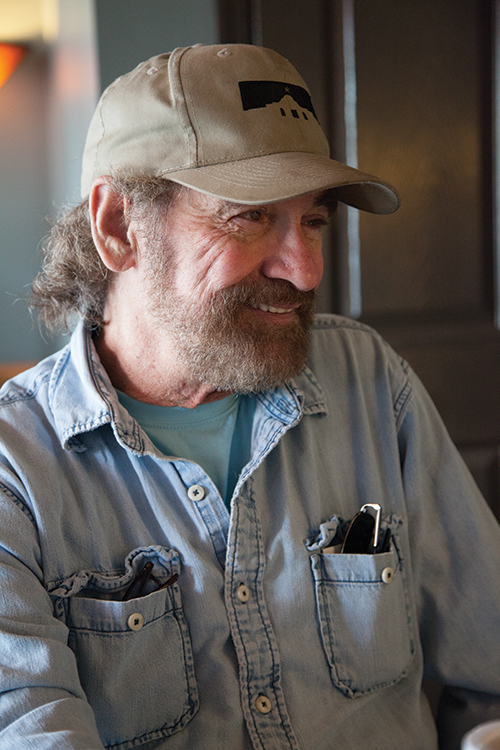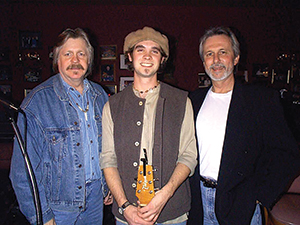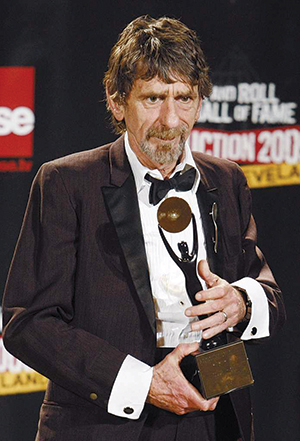Legends look back on their place in music history
| Watch Spooner Oldham’s acceptance speech at the Rock & Roll Hall of Fame |
Interviews by Michael Cornelison

The Shoals area of northwest Alabama, with the broad Tennessee River flowing through its rolling hills, has been a fertile ground for soul-filled rock ‘n’ roll since the early 1960s, producing an array of outstanding music that retains its magic, even today.
Contemporary music legends – Aretha Franklin, the Rolling Stones, Otis Redding and Lynyrd Skynyrd, just to name a few – ventured to this remote part of the state to try to capture its Southern magic in sound, provided in part by the songwriters, session musicians and production technicians who worked not for fame or fortune, but for the love of the craft.
While its golden era may have faded, the music studios of the Shoals continue to draw tourists and musicians alike today, buoyed by the success of the recent documentary “Muscle Shoals.”
Today, Southern rock ‘n’ soul is alive and well, and the last 50-plus years of music history still echoes within the walls of the legendary FAME Studios, started by music industry powerhouse (and rural Franklin County native) Rick Hall.
The competing Muscle Shoals Sound Studio, founded by the “Swampers” (FAME’s second house rhythm section) at 3614 Jackson Highway in Sheffield, was immortalized by the 1969 Cher album of the same name. After the “Muscle Shoals” documentary was released in 2013, Beats Electronics offered a project in partnership with the Muscle Shoals Music Foundation to preserve the rich history and culture of the iconic Muscle Shoals Sound. (The Muscle Shoals Music Foundation purchased 3614 Jackson Highway last year.)
Alabama Living art director Michael Cornelison drew upon his ties to the area (his father, Reuel Cornelison, is also a Shoals musician) to interview three of the many veterans of era; he sat down with Donnie Fritts, Mickey Buckins and Spooner Oldham, all natives of the area, to reflect on their life as Shoals musicians.
What follows is an edited transcript of the interviews with Fritts, Buckins and Oldham, each conducted separately in the Muscle Shoals area in 2014.
AL: How did you get started playing music?
Spooner Oldham: My dad had a band and they played around these parts. A lot of people still remember the old-timers, you know. I don’t know if they had a name to the band, I never have known that. I just remember being a toddler and all of them would get together. Dad played violin and sang tenor. The three sort of sang together, you know, harmonies.
AL: Was it country? Bluegrass?
Oldham: Well, it was all that. It’s hard to describe even today, because they did sort of Appalachian, a little Western Swing, a little of the Louvin Brothers, Delmore Brothers songs, so it was a little odd mix they had going on. But I remember, as a toddler, hearing them practice in the yard in the summer and in my grandmother’s living room when it wasn’t warm enough to go outside. So my ears got full of music pretty young and I didn’t realize, most of my life, that everybody didn’t have a band in their house. I think that kind of helped my consciousness to keep staying around music. I guess being around it so much, I felt I needed to continue doing that.
Donnie Fritts: I was already starting to play music when I was about 15. Different little bands, playing drums back then; and I met Tom Stafford (one of the founders of FAME Publishing) right there at the Shoals Theater. He was the assistant manager – I go to movies all the time, I mean every movie that comes out – and I talked to ol’ Tom and we got to be good friends. We kept talking about starting a publishing company, and I’m only 15 years old, but that was his dream, you know, to get a publishing company and a studio. What those talks that he and I had, that was kind of like the seeds of what would become the studio right down here on the corner above the city drug store.

Mickey Buckins: I was in the high school band. I was a trumpet player, and was piddling around with some rock ‘n’ roll bands. Just trying to get my musical thing going, I stayed in the high school band through the ninth grade. I got a chance to get involved in the studio. … Man, you know, that was it for me as soon as I got in that studio and saw what was going on. I knew that’s what I wanted to do for the rest of my life. I got the job with (Rick Hall at FAME Studios), just starting out as an assistant. Doing anything and everything that needed to be done. I just worked my way up the ladder to assistant engineer and then I became chief engineer. I managed a publishing company, I was the production coordinator, production manager years later, staff songwriter and session player.
AL: Are there people you have worked with who really stand out?
Oldham: Not really. They were all wonderful. … You know, each recording had its special moment for me. … (Singer/songwriter) J.J. Cale, I loved him. He’s dead now, but I got to work with him while on three or four albums. I went on tour with him. … I think my first tour I did, I didn’t really want to do a tour, but in the ‘70s, I think it was, things changed. Record labels were signing bands who wrote their own songs … and studio work as a session player, like me, basically there was lesser work. So what do you do next? If you want to stay in it you keep going. I got offered a gig, and I tried touring. I did a Linda Ronstadt tour, and then the next one Richard Betts, the next one was Joe Cocker, next was Bob Dylan, next was Neil Young and I finally adapted to the scenario.
Fritts: I have been very lucky, very blessed to have songs cut by my very (favorite) artists: Ray Charles, Bobby “Blue” Bland, The Stones, (Bob) Dylan cut one of my songs. All these great artists. Dusty Springfield cut (“Breakfast in Bed”).
Buckins: Well, that’s a long long list. Being in the studio with Otis Redding, and that was very short lived … I was singing all these Otis Redding songs, and all these great R&B songs and here I am in the studio with Otis. Just to be in a room with Otis Redding was just more than I could hardly stand, it was just an unbelievable experience.
AL: What’s it like, having people you look up to recording your songs?
Fritts: I can’t even describe. I mean, ‘cause Ray Charles was my idol; still is. He was the guy that always said – well, ‘cause there’s no way in hell I could be even a million miles close to this guy in talent, but I always said, “I want to do the same thing this guy is doing somehow, you know.” I mean even at an early age. Then in 1978, he cut a song that I had a part of. To this day, it was like the best thing that ever happened to me as a songwriter; and still is the best thing that’s ever happened to me as a songwriter.
AL: What song was it?
Fritts: It was a song called “We Had It All,” but that’s the one that Keith, with The Stones, when The Stones cut the song he sang it. It just came out about two years ago. He cut it back in ’78 … ’79, I think, but for some reason they didn’t put it on the record they recorded. I don’t know Keith Richards, but we exchanged ideas with one another through friends and stuff, but he’s always said that’s his favorite song and it meant a lot to him at the time. When he cut it, he was going through divorce or separation or whatever, but a lot a lot of people cut that song. … I wrote a lot of songs, got a lot of songs cut by really great people which is a great honor that I’ll never take for granted.
AL: I’m sure you come across things that come over the radio that you’ve played on, or been a part of. What goes through your mind? Does it take you back?
Oldham: I’m such a sound-oriented person, I think. The music, the sound, sort of can rejuvenate my spirit or bring it down, whatever the mood is. If I hear something on the car radio that I did 30 years (ago) and it sounds good to me still, I still enjoy it. I’m just all about sound. It’s not really ego or personality so much. I like what I’m hearing in its entirety. Fortunately, a lot of the stuff recorded on tape still sounds really good.
AL: What’s your reaction when you hear those songs?
Buckins: Aw man, I remember so well. When I hear a song that I’ve played on, I can pretty much just see the scene in my mind. I can see the studio, I can see the artist, I can see the players, circumstances and just kind of how it felt. You know, and most of it is real good, positive, great feelings. Just very few of them were not real pleasant experiences, I must say, and that says a lot. You really go through a lot as a session player; you play very long, especially if you play a long time for a lot of years, you’re going to go through all ups and downs, the goods and the bad. You just go in and do your job. You’re paid to like what you’re doing, you’re paid to play. For the most part it was all wonderful.
AL: What do you think it is about this area that has produced so many talented musicians? Why not somewhere else?

Oldham: Well, it’s hard for me to evaluate that. My experience is I know what happened to me. I was just around a lot of great musicians, a lot of great recording engineers, a great recording studio and all motivated to do the same thing. Let’s get this thing off the ground, you know, let’s fly this sucker. There were a lot of musicians, I mean as a youngster. There was Terry Thompson, he’s one of the most heroed guitar players ever here. Any guitarist that ever heard him will tell you the same. He died at 27. So, you know, I’m saying people got started early and they played great.
I was fortunate enough to be around all those great players that I could find, if they could find me. So it was just a family situation. We all knew each other, all wanting to do something similar — play. A few of us wanted to write songs, but not many. You’d just get in bands, or play on recordings if you had the opportunity, you know, The studio and Rick Hall, he had a lot to do with it and forming a studio and place to go, so that helped. If you hadn’t had that back in those days, it would’ve taken a lot longer. And a good facility too. Not only a place, but it was a wonderful recording facility. It had top grade microphones and speakers, it was the best.
Buckins: I think it’s a spiritual thing. It goes way back to the Native Americans, the singing river. It’s the land. It’s the mud. It’s the river. It’s the people. It’s where we’re located. There’s great music all around us, you know, from the Mississippi Delta and Memphis to Georgia up into Tennessee.
As far as the players go, we all were so eclectic. I mean, we all loved every kind of music and the mixture of ability of all the players from around here were not limited to any one style.
Fritts: I’ve been asked that all over the world. I’ve yet to come up with a good answer. I don’t know how we got that many talented people in this little bitty area. It ain’t like we’re in New York, this is a very small area; but you came up with a bunch of really talented people who are committed to doing it. … You’ve got to be totally committed to it. So, that’s the way we were. I didn’t go out and play, I never did that s***. I was music and all I thought about was music starting when I was 15.
AL: What advice would you give to kids who say, “I want to be there someday”?
Oldham: Come on down. It’s where your heart is, it’s not where you live. If your heart is in the right place, you can do well here. If your heart’s not in the right place then stay where you are, because you won’t be welcomed. Yeah, like I said, the elements are here for anybody to do well. Good studios, good players and good songwriters. Or if you want to write your own song, you can find a place to do that around here with no problem. Maybe even somebody will write with you if you have that missing in your life.
[hr]
WANT TO GO?
The Muscle Shoals Sound Studio, known as the 3614 Jackson Highway Studio in Sheffield, is open for tours from 10 a.m.-2 p.m Monday-Thursday and 10 a.m.-4 p.m. Friday-Saturday. Call Bonnie at 256-394-3562 for more information, or log on to www.msmusicfoundation.org.
FAME Music Group, 603 E. Avalon Ave. in Muscle Shoals, is open for tours at 9 a.m., 4 p.m. and 5 p.m., Monday-Friday. No reservations needed. Call 256-381-0801 or log on to www.fame2.com.
If you’re planning a music-themed trip to northwest Alabama, be sure and make another stop.
The Alabama Music Hall of Fame, 617 Highway 72 in West Tuscumbia, is open from 9 a.m.-5 p.m. Tuesday-Saturday. For information, call 256-381-4417 or log on to www.alamhof.org.




